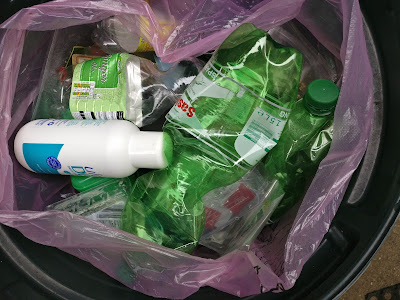This blog may help people explore some of the 'hidden' issues involved in certain media treatments of environmental and scientific issues. Using personal digital images, it's also intended to emphasise seasonal (and other) changes in natural history of the Swansea (South Wales) area. The material should help participants in field-based modules and people generally interested in the natural world. The views are wholly those of the author.
Monday, 7 February 2022
Micro-Organisms to Munch Plastics?
A 2017 study, estimated that a total of 8.3 bn tonnes of plastics had been manufactured. More recently, 367m tonnes were made in 2020. The annual quantity generally increases every year. Plastic waste causes problems in many locations. Its manufacture from petrochemicals also releases large quantities of 'greenhouse gases'. There has been lots of excitement about the possibility of utilising micro-organisms to 'eat' plastic waste. But, where precisely are we? (https://www.theguardian.com/environment/2022/feb/05/how-super-enzymes-that-eat-plastics-could-curb-our-waste-problem). For a number of years, scientists in many universities have been studying bacteria that have the ability to breakdown certain plastics. Particular excitement has been generated by Japanese studies of the bacterium Ideonella sakaiensis. This bacterium appears to feed exclusively (meaning it has, at present, no competitors) on a tough plastic, used in bottle-making, called polyethylene terephthalate (PET). The micro-organism has two enzymes (biological catalysts). One, PETase, breaks the plastic down into smaller mono (2-hydroxyethyl) terephthalic acid (MHET) molecules. The second, MHETase, then breaks these smaller molecules into ethylene glycol and terephthalic acid. Ethylene glycol and terephthalic acid are the chemicals used in the manufacture of PET. In theory, therefore, Ideonella sakaiensis's enzymes could be used to effectively recycle PET. This would reduce the need to use new petrochemicals (and generating emissions whilst doing so) to create useful (if problematic) plastics. Plastics can be tough, light and easily sterilised. Ideonella sakaiensis digestion of PET is slow. A group at the Centre for Enzyme Innovation have linked PETase and MHETase together to make a 'super enzyme' that eats PET about 6 times faster than when the two biological catalysts work separately. 'Tweaking' the enzyme structure has also improved its effectiveness. A number of institutions are now attempting (with commercial input) to set up plants to use micro-organisms to properly recycle certain plastics. As, however, such plastics need to be heat-softened first, releasing the micro-organisms into the environment to do their work would be pointless. This might, anyhow, have been a bad idea, as the bacteria would not discriminate between waste plastics and those serving useful functions. There really is no alternative to picking up our waste plastics! We should certainly not be annually allowing more than 10m tonnes of plastics to finish up in our seas.
Subscribe to:
Post Comments (Atom)
-
I n the UK and US, a pparently popular and successful vegan/vegetarian restaurants are reportedly closing or adding meat to their menus ( ...
-
Early ripening fruit may seem convenient but some folk think it confirms environmental stress. There's also a possibility th...


%20mating%20NWCW.jpg)


No comments:
Post a Comment